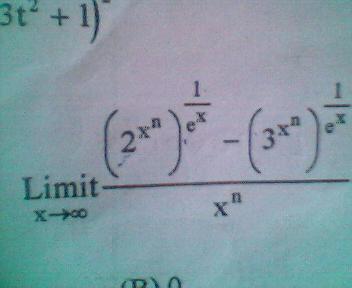Anybody knows how to do this??
6 Answers
Mani Pal Singh
·2009-05-26 10:24:25
it must be 0
look mirka
it is
2x^n/e^x-3x^n/e^x/xn
look the denominator is ∞
and ex>xn when x tends to ∞
and the numerator is 0
so the limit is 0
msp
·2009-05-26 19:56:32
it is zero becos.
u can see clearly that the denominator goes enormously high when it approaches infinity compard to the numerator.
